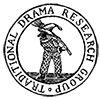Born in 1855 in Brompton, Middlesex, Thomas Fairman Ordish was educated privately and by the age of 15 employed as a publisher’s clerk before moving on to same role at the Patent Office in London where he was to work for the rest of his life. During that time, he developed passionate interests in such topics as London antiquities and social life, Shakespeare, early London theatres, and subsequently traditional drama. He was not a ‘professional’ academic but filled his leisure time by researching and writing on a variety of topics which interested him. The mummers’ play and sword dance drew him towards folklore and in 1886 he was elected a member of the Folklore Society in which he played an active part until 1909. In 1918, at the age of 63, Ordish was forced to retire early through illness, possibly a victim of the 1918-1919 influenza epidemic. At that point, he moved from London to live in Herne Bay, Kent. He died on 5 December 1924 in a nursing home in Leytonstone, Essex.
Ordish’s papers represent the first systematic collection of traditional folk drama materials in England. The period covered is 1886 to 1923. The collection comprises about 670 records on British and Irish folk plays, and now arranged in county order.
The original collection is deposited with the Archives of the Folklore Society in the Special Collections of University College London Library. (Files for Cornwall, Essex and Northamptonshire seem to be now missing.)
The late Alex Helm edited and enlarged a typescript copy in 4 volumes, and deposited copies in the Archives of the Folklore Society and the Vaughan Williams Memorial Library. (In the latter, volumes 1 and 3 are now missing.) He also transcribed much of the collection as volumes 5 to 8 of his own Collection.
The original collection has been digitised and now forms part of the Vaughan Williams Memorial Online Digital Archive.
Access to the originals is through University College London Library. The digitised collection is available at https://www.vwml.org/browse/browse-collections-full-english/browse-tfo
For further details on Thomas Fairman Ordish, see Paul Smith, ‘Thomas Fairman Ordish (1855-1924): A Lasting Legacy’, Lore and Language, 15, 1-2 (1997), 84-116 (attached below) and Eddie Cass, ‘T. Fairman Ordish and the British Folk Play’, Folklore, 121, 1 (April 2010), 1-11
